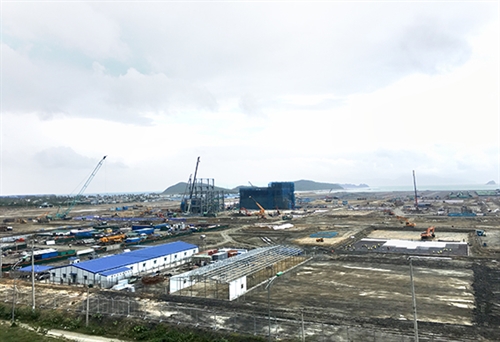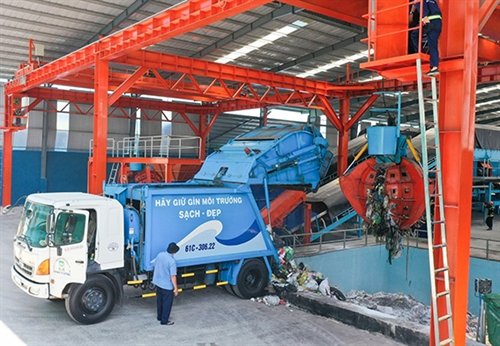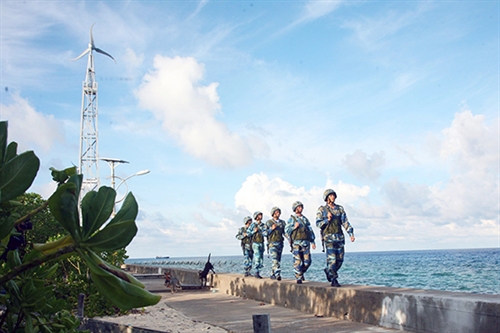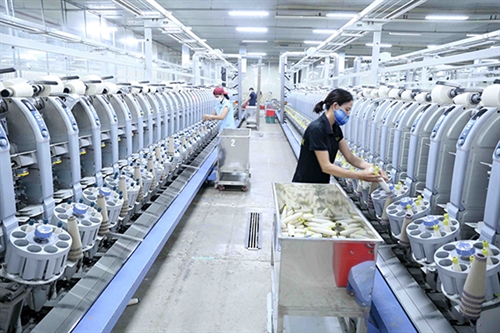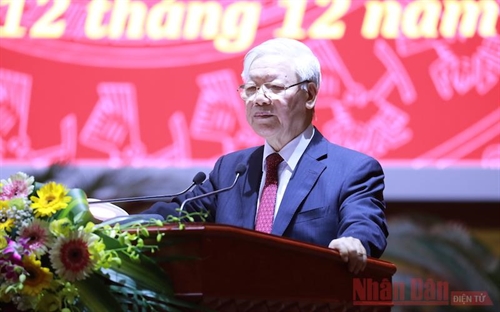Nguyen Phuoc Tho
Legal Department
Government Office
Immediately after being reshuffled at the 11th session of the 14th National Assembly, the Government directed[1] the review and assessment of its Working Regulations[2] in order to early introduce a new one reflecting the practical situation and requirements as well as inheriting valuable experiences drawn from the past implementation.
The following fundamental contents of the Government’s Working Regulations need to be amended to improve and renew the working styles of the Government and the Prime Minister to meet the new circumstance requirements.
Renewing the elaboration and materialization of working programs of the Government and the Prime Minister
Elaborating and materializing the working programs of the Government and the Prime Minister play an extremely important role for their effective and efficient direction and administration. This work should be carried out in a scientific and professional manner to ensure high-quality and feasible schemes and projects be promptly formulated and implemented or submitted to competent bodies for promulgation.
According to the correct perception and guiding principle, annual working programs should be formulated not only for the immediate future or just a year but also with a strategic vision for the distant future. They should not merely contain lists of schemes and projects to be elaborated and promulgated in a single year. The working programs of the Government and the Prime Minister should reflect not only requirements of their management and administration work but also the strategic and comprehensive management and administration requirements over many years in a working tenure or beyond. Thereby, it is necessary to change the approach of separation and isolation in the elaboration and materialization of working programs year by year without taking into account a long-term strategy.
As the Government is the center of the political system, placed under the Party’s leadership, the Government and the Prime Minister maintain close relations with various Party bodies, agencies and organizations in the state apparatus (at the central and local levels) and the entire political system. Their working programs not only deal with the internal affairs of the Government but also ensure the connection, coordination, continuity and consistency with those of the Central Committee, the Political Bureau and the Secretariat of the Party as well as the legislative programs of the National Assembly, working programs of the National Assembly Standing Committee, National Assembly agencies, the President, the Vietnam Fatherland Front, etc.
The most important basis for renewing the working modes of the Government and the Prime Minister is to establish synchronous legal standards in the formation of their working programs towards cohesion, professionalism, identifying priorities and focuses in the national management and administration at every specific stage and periods of time, while ensuring the comprehensiveness and coverage of direction and administration activities of the Government and the Prime Minister as well as the relations with different institutions in the state apparatus and the political system. In reality, the absence of a comprehensive and synchronous legal framework is a major cause of current inadequacies and limitations of the formation and materialization of working programs of the Government and the Prime Minister. Back in 1997, the Government Office already suggested “the formulation and promulgation of regulations on elaboration of the working programs of the Government and the Prime Minister”[3]. Until now, such regulations have not yet been elaborated and promulgated.
So, the Government’s Working Regulations should be revised this time for supplementation and synchronous perfection of regulations on the elaboration and materialization of the working programs of the Government and the Prime Minister towards amending the principled provisions on the following fundamentals:
- Criteria and conditions of a scheme or a project to be considered and incorporated in the annual working programs of the Government and the Prime Minister;
- The requirements on the focus and priority order of schemes and projects in the working programs. The identification of the role and responsibility of the Government Office in proactively studying and proposing focal and priority issues in the weekly, monthly, quarterly and annual working programs of the Government and the Prime Minister;
- The responsibility, order and procedures for elaboration and promulgation of working programs, with the necessity to provide the process of strict, objective and transparent verification and assessment of the Government Office for every scheme or project proposed by ministries, ministerial-level agencies and local administrations for inclusion in the working programs.
- The mechanism of coordination between the offices of the Government and the Party Central Committee, the National Assembly and the President in the formulation, promulgation and materialization of working programs.
- The mechanism of monitoring, urging, inspection and evaluation of the implementation of working programs, with the Government Office playing the primary role in monitoring, urging and examining the timely, scheduled and qualitative preparation of schemes and projects by ministries, ministerial-level agencies and other bodies for submission to the Government or the Prime Minister.
Based on the above-mentioned principled provisions, implementation measures should be detailed in a legal document, which will create a foundation for the formation of a synchronous mechanism to ensure the full and strict adherence to the principles, criteria, standards and process in the elaboration and materialization of working programs of the Government and the Prime Minister. Such mechanism should be composed of the Government and the Prime Minister, who raise the viewpoints and guidelines in the formulation of the working programs for the whole tenure and each year with the identification of priorities and focuses; the division of tasks, powers and responsibilities among ministries, ministerial-level agencies and localities throughout the process of preparing, proposing and formulating schemes and projects for consideration and approval, and materialization of the programs, ensuring publicity, transparency, proactivity and accountability of every stakeholder, attaching importance to the Government Office’s prominent role of verifying, monitoring, inspecting and assessing the formation and materialization of working programs.
The contents and adjustment of programs should be implemented under the Prime Minister’s decisions, rather than administrative documents issued by the Government Office.
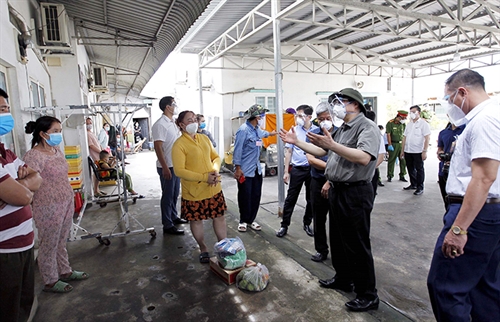 |
| Prime Minister Pham Minh Chinh (second from right) on a working trip to inspect social welfare services for migrant workers in Ho Chi Minh City on Aug. 26__Photo: Thanh Vu/VNA |
Modifying the contents and ways of organizing Government sessions
For the Government as a collective, the biggest question is to further improve the quality of policy planning and administration (including policy response), to settle strategic issues, ensuring the sensitiveness, promptness and feasibility of adopted policies and undertakings. In the recent past, this has not yet been fully realized according to responsibility and functions, especially in the settlement of problems in the course of renewal; the study of mechanisms and policy planning by the Government still largely relies on the suggestions, advices and preparations of ministries.
The quality and efficiency of Government sessions should be further improved to ensure that important issues are thoroughly and substantively debated and discussed, then approved at Government sessions.
In order to raise the quality and efficiency of Government sessions, a number of following measures should be taken:
- To determine a rational quantity of schemes and projects and carefully scrutinize and prepare schemes and projects one by one for submission at each session. Not to put before Government sessions for discussion and approval any schemes and projects not yet studied and drafted according to the established order and procedures, without adequate dossiers or still containing unclear or controversial issues.
- On the basis of the quantity, objectiveness and complexity of schemes and projects at each session, and the review and discussion order and procedure applicable to every scheme and project, to propose the Prime Minister to decide on a reasonable duration for each Government session, which should not exceed two days (or three days for special cases). With such duration, in order to ensure the quality of discussions, major and very complicated schemes and projects with divergent opinions raised in discussions should be considered and approved by the Government not necessarily at one but possibly many sessions or in combination with other forms (for instance, not raising this issue at subsequent sessions, the Government may authorize the Prime Minister to direct the distribution of opinion cards to the Government members or to request the sponsoring agencies to study the opinions raised by cabinet members at sessions, finalize the schemes or projects for submission to the Prime Minister for consideration and decision).
- To strictly comply with the established discussion and approval procedures applicable to a scheme or project, ensuring democratic and substantive discussions of cabinet members. To redress the situation of too brief presentation, simultaneous presentation of many schemes and/or projects at a time for discussion and passage of the whole packages of schemes or projects.
- To be properly aware of the nature and significance of the collection of comments from cabinet members on schemes to be submitted before Government sessions. The collected comments only serve merely as references mainly in service of the Government Office’s verifications not as the Government’s opinions. This is totally different from the cases where the Prime Minister deems it unnecessary to discuss and approve schemes or projects at Government sessions but decides to collect the cabinet members’ comments for approval by majority, then submit them to the Prime Minister to sign for promulgation.
- In addition to regular sessions, to organize topical sessions for discussion and approval of major and complicated issues or for bills, draft resolutions, reports to be submitted to the National Assembly or the National Assembly Standing Committee.
In recent years, the Government has attached importance and devoted more time to topical sessions on legislation and institutional building although inadequacies and limitations remain such as delayed promulgation and poor quality of legal documents, thus failing to satisfy the requirements of the Government’s management and administration work. Topical sessions should focus on discussing legislative proposals; draft laws; draft decrees of the Government; key and strategic issues as well as problems in building and improving the legal system and law enforcement under the Government’s jurisdiction.
- For the Government sessions held behind closed doors, the non-inviter principle should be strictly complied with, except certain cases[4]. The results of sessions will be announced to the public by Government spokespersons at press conferences. This is a common practice in the world to ensure the cabinet members’ democratic discussions, freedom of idea and straightforward exchange of opinions before the Government reaches quality conclusions on policy matters, including not a few important, sophisticated and sensitive policies.
Proposed changes to the Working Regulations’ provisions on Government sessions
In order to heighten the quality and effectiveness of Government sessions, the current Working Regulations’ provisions on Government sessions should be revised from Articles 24 through 31 as follows:
(1) According to Article 44.1 of the 2014 Law on Organization of the Government, which was amended in 2020, the Government sessions include: (i) regular monthly sessions; (ii) topical sessions; and (iii) irregular sessions to handle affairs arising unexpectedly.
The Working Regulations should be added with specific provisions on the conditions and contents of each type of the above-mentioned sessions, especially increasing topical sessions.
(2) To ensure the compliance with the provisions of the 2013 Constitution and the Law on Organization of the Government, regarding the competence to decide on or request the convening of Government sessions, the Working Regulations should specify cases where Government sessions are requested by the President or by one-third of the cabinet members. At the same time, the responsibility of relevant agencies, the meeting agenda preparation procedures and the Government session process in these cases also need to be clearly defined.
(3) To review the provision: “For clear matters over which there are no divergent opinions between ministries or agencies, which fall under the deciding jurisdiction of the Government, the Minister-Chairperson of the Government Office shall present the sum-up reports on matters to be submitted to the Government for consideration and approval by vote”[5] in the current Regulations as it does not adhere to the principles of the Government’s activities, under which all matters raised at Government sessions must be discussed and comply with the established order and procedures to ensure democracy.
Improving provisions on authorization
Authorization is an important factor in the management and administration relations of the Government and the Prime Minister.
In these relations, authorization has become more common in various forms. Together with decentralization and power division, reasonable authorization has become an important factor for ensuring the flexibility, raising the effect and effectiveness of the Government’s and the Prime Minister’s management and administration.
Authorization here should be understood as handling one’s affairs through other persons, namely “appointing other persons to use some powers assigned to him/her by law”[6] or similarly “assigning another person to perform a task under one’s responsibility or jurisdiction”[7]. In the state management, it is unlike decentralization and power division. When authorizing a task or power, the authorizer shall remain liable before law for the implementation of such task and power; meanwhile, the authorized must comply with the conditions required by the authorizer and be subject to the inspection and supervision by the latter.
The term “authorize” must be used to replace the word “assign” in Article 3.4 of the current Working Regulations: “The Government may assign the Prime Minister to consider and decide on its behalf unexpected and urgent matters which must be urgently settled under the Government’s competence, or on matters a agreed in principle by the Government. The Prime Minister shall report at the upcoming Government sessions on issues already decided”. In this provision, the word “assign” has been used improperly in two aspects. Firstly, the Government cannot assign tasks to the Prime Minister as the “Prime Minister” institution is constitutionally defined as relatively independent from the “Government” institution. The Prime Minister is not a subordinate of the Government. Secondly, the content and spirit of this provision in essence mean authorization, not assignment, since the assigned tasks will be performed by the assignees under prescribed competence, who bear responsibility without having to report to the assigners.
Meanwhile, Article 3.5 of the Government’s Working Regulations provides that the Government “authorizes” local administrations[8]. This provision is inaccurate as according to the Constitution and the Law on Organization of the Government, there exists no relationship of “authorization” but the relationship of decentralization and division of power between the Government and local administrations. Moreover, the local administrations include the People’s Councils and People’s Committees of provincial, district and commune levels. So, the authorization to such large local administrations without the specific identification of the authorized subjects would make the Government unable to control the performance of authorized tasks and powers. However, in certain cases one or several specific provincial-level People’s Councils or People’s Committees can be authorized to handle specific issues according to the mechanism of strict inspection, supervision and control, as the Government will be ultimately accountable to the performance of authorized tasks and powers.
Improving the Government’s authorization
The Government’s authorization to the Prime Minister constitutes a mode of handling affairs by the former. Therefore, Article 3.2 of the current Working Regulations should be added with the mode of handling affairs via authorization to the Prime Minister. Thereby, the Government will handle affairs by three modes: (i) discussing and resolving at Government sessions; (ii) distributing opinion cards to the Government members; and (iii) authorizing the Prime Minister, provincial-level People’s Councils and People’s Committees.
The Government’s Working Regulations should clearly define the authorization scope, order and procedures; liability in implementation of authorization; and the mechanism for examination, oversight and assessment of implementation of authorization.
Promoting the Prime Minister’s authorization
Article 95.3 of the 2013 Constitution provides: “Deputy Prime Ministers shall assist the Prime Minister in his work as assigned by the Prime Minister; and are responsible to the Prime Minister for their assigned tasks. In the absence of the Prime Minister, a Deputy Prime Minister delegated by the Prime Minister shall lead the work of the Government on behalf of the Prime Minister”. The Constitution clearly establishes the principle of the relationship between the Prime Minister and his deputies, namely the principle of authorization. So, Deputy Prime Ministers have no tasks and powers of their own. Their tasks and powers are those authorized by the Prime Minister. Hence, they are held accountable to the Prime Minister for the performance of authorized tasks and powers. Yet, in principle, the Prime Minister will be in the end accountable for the performance of tasks and powers authorized to his deputies.
Establishing the regime of full, specific and transparent responsibility in authorization
Consolidating the guiding, monitoring, inspecting and supervising tools of the Government and the Prime Minister in the performance of authorized tasks and powers constitutes an important requirement to ensure the regime of responsibility for the authorizers and the authorized.
One of the important principles of authorization is that the authorized must be fully capable and qualified to implement the authorization, ensuring that authorization will not lead to the abuse of powers and that the authorized tasks and powers are properly performed. On the other hand, through constant monitoring, inspection and supervision, the Government and the Prime Minister can control the authorized powers, prevent the abuse of powers by the authorized.
As the working apparatus of the Government and the Prime Minister, the Government Office should have its capability enhanced in order to be able to assist the Government and the Prime Minister in guiding, examining and supervising the implementation of authorized tasks and powers.
Properly identifying the relationship between the Prime Minister and ministers, heads of ministerial-level agencies
In order to bring into play the roles and responsibilities of both the Prime Minister and the ministers as well as heads of ministerial-level agencies in management and administration work, it is necessary to put an end to the reality that ministers “kick up” affairs under their respective jurisdiction to the Prime Minister for settlement or the Prime Minister personally directs the settlement of jobs falling under the competence and responsibility of ministries or ministerial-level agencies. This requirement should serve as the guideline in amending and supplementing the Working Regulations of the Government. In that spirit, Article 5.2.e of the current Working Regulations of the Government should be removed while the provisions: “The Prime Minister shall not handle jobs under the settling jurisdiction of ministers, heads of ministerial-level agencies, government-attached agencies or chairpersons of the provincial-level People’s Committees” in the Government’s Working Regulations promulgated together with Government Decree 23 of 2003 should be restored.
The Prime Minister plays a key role in leading and running general activities of the Government, serves as a factor regulating the common objectives and promoting all activities of the Government and the administrative system in the performance of law-prescribed functions and competence.
In his relations with ministers, the Prime Minister focuses on directing and coordinating activities among ministries, settles matters falling beyond the competence of ministers and personally directs the handling of big and unexpected tasks, serious incidents such as natural calamities, pandemics, etc., which fall beyond the handling scope of a ministry or ministerial-level agency and require the Prime Minister’s powers to rally and coordinate resources from multiple ministries, ministerial-level agencies and localities for the effective settlement in a given time.
With such role and competence, the Prime Minister and Deputy Prime Ministers should fulfill their respective responsibility in handling promptly and properly matters reported by ministers, heads of ministerial-level agencies, heads of government-attached bodies or provincial-level People’s Committees for the directing opinions under the Prime Minister’s handling competence.
3. Detailing the Law on Organization of the Government’s principled provisions on a number of the Prime Minister’s tasks and powers concerning the roles and responsibilities of ministers, heads of ministerial-level agencies such as important inter-branch matters, handling natural disasters, epidemics or calamities which fall beyond the jurisdiction of the latter.
At the same time, the order, procedures, responsibility and time for settlement by the Prime Minister or Deputy Prime Ministers should also be clearly defined, without referring matters back to ministries and ministerial-level agencies for further study. This must be the new working mode of the Prime Minister, who has ordered the Government Office, “when working with ministries and ministerial-level agencies, to show its sharing and remove difficulties in the “three-not” spirit: not to say no; not to say difficult; not to say yes but do nothing”[9]. In order to meet the requirements of this working mode, the Government Office plays a very important role in not only coordinating and supporting the Prime Minister, Deputy Prime Ministers in preparing relevant dossiers and documents but also working directly, timely and continuously in detail with ministries, ministerial-level agencies, localities, relevant bodies and organizations to acquire adequate grounds and information for advising on and proposing options to settle problems.
In short, to change the working style of the Government, the revision of the Government’s Working Regulations becomes a must. In addition, since the Government Office plays an important role in the working mechanism of the Government as a collective and the Prime Minister, its functions, tasks and powers should be also revised to ensure the synchronism and efficacy of the new working mode of the Government and the Prime Minister.
Such working mode is still governed by various current laws, which are yet revised immediately. Therefore, the revision of the Government’s Working Regulations must take into account appropriate steps to ensure the feasibility, legality, synchronism and consistency with the current legal system.-

